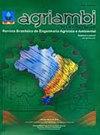Growth, yield and gas exchanges of ‘D’Angola’ plantain under different plant densities
IF 1.4
4区 农林科学
Q3 AGRICULTURAL ENGINEERING
Revista Brasileira de Engenharia Agricola e Ambiental
Pub Date : 2020-07-01
DOI:10.1590/1807-1929/agriambi.v24n7p490-496
引用次数: 3
Abstract
ABSTRACT Information about production, crop systems and economic viability for technical grown of plantain are scarce in Brazil. Few technologies developed specifically for plantain are available; thus, there are many adaptations of information on banana crops extrapolated to plantain. The objective of this study was to evaluate the growth, nutritional status, gas exchanges, water use efficiency and yield of ‘D’Angola’ plantain under different plant densities, in the first production cycle. The treatments consisted of six plant densities (1,111; 2,500; 2,777; 3,125; 3,571; and 4,166 plants ha-1), which were evaluated in a randomized block design with four repetitions. Vegetative growth, leaf nutrient concentrations at the flowering stage, gas exchanges (monthly) at two reading times, fruit yield and water use efficiency at harvest were evaluated. The nutritional status is not dependent on plant density. The vegetative growth varied, regardless of the plant density, whereas the leaf area index increased as the plant density was increased. The leaf temperature increased as the plant density was increased. The water use efficiency for fruit yield, as a function of plant density, fitted to a quadratic model, with the maximum value at 3,301 plants ha-1. The use of 3,333 plants ha-1 is recommended for plantain.不同种植密度下“安哥拉”车前草的生长、产量和气体交换
在巴西,关于大蕉技术种植的生产、作物系统和经济可行性的信息很少。专门为大蕉开发的技术很少;因此,香蕉作物的许多适应性信息被外推到大蕉上。本研究旨在评价不同种植密度下‘安哥拉’大蕉第一个生产周期的生长、营养状况、气体交换、水分利用效率和产量。处理包括6个植物密度(1,111;2500;2777;3125;3571;4166株(ha-1),采用随机区组设计,重复4次。评价了植物的营养生长情况、花期叶片养分浓度、两次采穗期气体交换(月)、果实产量和收获期水分利用效率。营养状况不依赖于植物密度。营养生长随密度的增加而变化,叶面积指数随密度的增加而增加。叶片温度随密度的增加而升高。果实产量水分利用效率随植株密度的变化符合二次型模型,在3301株hm -1时达到最大值。车前草的推荐用量为3333株/公顷。
本文章由计算机程序翻译,如有差异,请以英文原文为准。
求助全文
约1分钟内获得全文
求助全文
来源期刊

Revista Brasileira de Engenharia Agricola e Ambiental
Agricultural and Biological Sciences-Agronomy and Crop Science
CiteScore
2.70
自引率
16.70%
发文量
114
审稿时长
3-8 weeks
期刊介绍:
A Revista Brasileira de Engenharia Agrícola e Ambiental (Agriambi), periódico oficial da Asociación Latinoamericana y del Caribe de Ingeniería Agrícola (ALIA), é editada mensalmente, no formato eletrônico, pela Unidade Acadêmica de Engenharia Agrícola (UAEA) do Centro de Tecnologia e Recursos Naturais (CTRN) da Universidade Federal de Campina Grande (UFCG), destinando-se à divulgação de artigos científicos originais e inéditos, elaborados em Português, Inglês ou Espanhol. Com o auxílio de pareceres de Consultores, os artigos são aceitos ou não pela Equipe Editorial para publicação na Revista. A Agriambi aceita, também, a submissão de contribuições na modalidade de revisão de literatura.
 求助内容:
求助内容: 应助结果提醒方式:
应助结果提醒方式:


